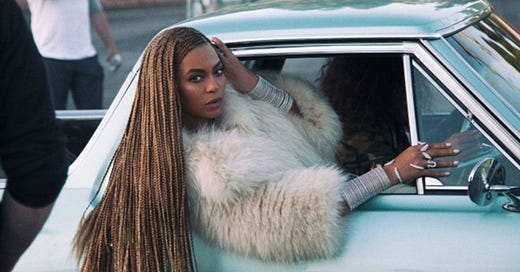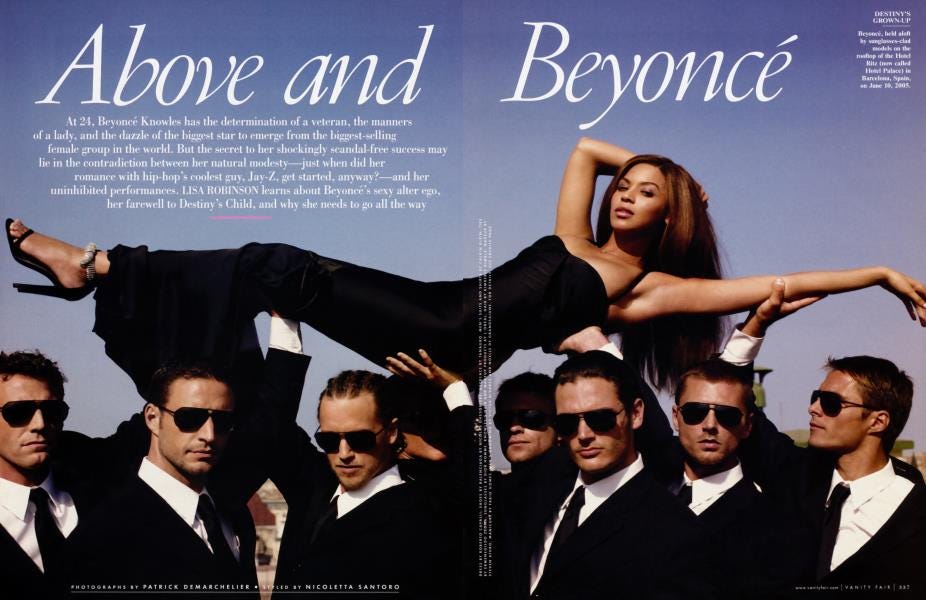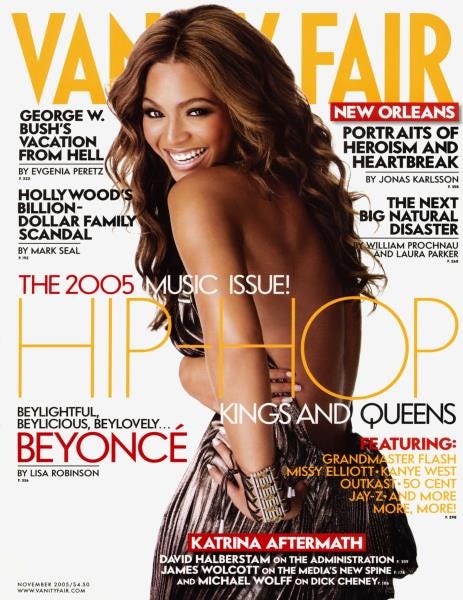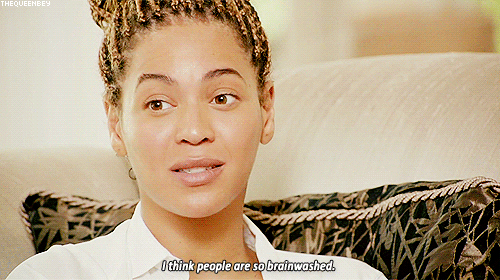Issue 7: When Beyoncé Talked
Before she became a superstar enigma, the Queen Bey did give interviews, but the foundations of her future strategy were always there.
What better way to head into February than with the Queen herself, and a dive into that weird time in her life where she, gasp, gave interviews.
Vanity Fair. "Above and Beyoncé." November 2005. Lisa Robinson.
(Image via Vanity Faie.)
The idea of Beyoncé being interviewed in 2024 seems weird. The Queen Bee has successfully moulded herself into a figure of impenetrable might and utmost control. She doesn’t spill all to Vogue or play party games on late-night talk shows. When she wants to promote a project, all she has to do is turn up on a red carpet looking incredible. Sometimes, she can skip even that part and drop the album with zero hype. She is the hype. At a time where private spaces seem to be extinct for everyone but more so celebrities, and the demands for so-called relatability put A-Listers in impossible binds, Beyoncé continues to be a fascinating exception to the rule.
It took her a while to get there, of course. Once upon a time, she had to put up with nosey junkets and turn up on VH1 shows and hope the media paid attention to her when she had an album or movie to sell. The former child of destiny was a star, yes, but there was a world of difference between the Beyoncé of then and the Beyoncé of now. She had to follow the rules, not dictate them.
This makes reading what is ultimately a pretty traditional Vanity Fair cover story a far more intriguing prospect. You can’t help but see every carefully planned answer and moment of reluctance as the beginnings of her future strategy of pristine management. Writer Lisa Robinson, a veteran of music journalism, describes her thusly:
"Here's the thing about Beyoncé Knowles: whether it's a flawless performance in front of millions balanced on one foot, or privately limiting herself to a tiny slice of carbohydrates, this supremely talented singer, dancer, songwriter, producer, and actress—who started performing at the age of seven—has, in just 17 years in show business, absorbed a lifetime's worth of focus, determination, and discipline."
It’s a good approximation of her subject’s appeal, but this specific is in reference to her seeing Beyoncé eat a sliver of a two-inch brownie at a Grammy party, which Beyoncé said made it “not so bad to eat.” Just in case you were wondering if the body tyranny and food-shaming of the 2000s was as bad as you remembered it being. And yes, it is squirm-inducing to see Beyoncé of all women (or any woman, really) get applauded for denying herself a tiny chocolate treat. Who else read that part and was reminded of the wall-to-wall coverage Beyoncé’s juice cleanse for Dreamgirls got?
Remember when this pose was on every fashion magazine cover? (Image via Vanity Fair)
You do sense some kind of discipline in how Beyoncé tries to avoid revealing too much about herself to Robinson. This wasn’t uncommon for her at this time. When she appeared on Oprah and was asked about her wedding to Jay Z in TK, she put a lot of emphasis on the word “private” to describe the occasion. Their big day was locked down like Fort Knox and kept out of the spotlight until she put it into some of her work. She dispels a couple of rumours, like claims that she grew up poor, but she’s not spilling details if she can avoid it. When we get answers of reasonable substance, they're positioned in a very standard Q&A format. Robinson asks, "Are you still shy" and Knowles responds, "I'm not shy anymore, but I'm still private." Again, private. But she does talk about her parents and Jay and her love of the work. She's pressed on whether or not she plans to marry and have kids anytime soon, which feels weird when you remember she's only 23 here.
Perhaps the most revealing aspect of the profile is the Sasha Fierce of it all. Beyoncé talks about her sexy alter ego, who helped her to be that "other person" on stage who is sexy, confident, and in control, although it's not exactly dwelled on. Little is given more than a couple of lines. You get the sense that Robinson wanted to get as much into her word count as possible, and in hindsight given how little Beyoncé talks about herself to the world without a tight grasp over the narrative, you can't blame her.
A lot of the more interesting tidbits come not from Beyoncé herself but her mother Tina and even Jay-Z, her long-time boyfriend turned husband and mega-power couple collaborator. Tina shares stories of Beyoncé dealing with falls on-stage and her being a shy kid. Jay says that his collaborations with his future wife "gave her [was] a street credibility, a different edge." Again, she’s only 23 here, but already an industry veteran with a strong grasp on her public image that’s still in flux. When asked why she does so many product endorsements, she explains each one succinctly and later notes that she’s not comfortable talking about money. She doesn’t like when people are cruel about her Destiny’s Child sisters or her family, which seem to bother her more than lies written about herself.
This is a profile defined by white voices. It’s written by a white journalist, photographed and styled by white people, and the main image of the profile sees Beyoncé hoisted to the sky by a group of white dudes (including one with cornrows, eek.) You sense a kind of incredulity in the article about Beyoncé’s story, whether it’s having to note how her name is pronounced or Beyoncé herself having to push back against questionable narratives of her family, including people comparing her father to Joe Jackson. Her romance with Jay-Z is applauded for its privacy and for not fulfilling trainwreck celebrity stereotypes like, uh, "fleeing the police after a shoot-out in a nightclub" or wearing "PIMPS UP, HO'S DOWN jackets." These are part of a list of pointed and familiar examples of recent celeb drama, like Britney kissing Madonna on TV and her quickie Vegas marriage and annulment. But it still seems odd and kind of gross to pat Beyoncé and Jay on the backs for being "good" while citing what seems like a lot of anti-Blackness. When Robinson says Beyoncé "she of the "bootylicious," sexy dances—still manages to wear her success well while maintaining a sense of decorum in a world gone absolutely mad", I get a feeling of respectability politics being thrown into her face.
This was one of the major things to change when Beyoncé took the reins of her career and became intensely picky about interviews. Really, most of them aren’t even interviews so much as spotlight sessions, but they almost always centre Black voices, particularly behind the camera. When she sat down for a Vogue September Issue cover shoot in 2018, Tyler Mitchell, then only 23, to do the shoot. It essentially launched his career. When she covered Vogue UK in June 2022 to promote Renaissance, editor-in-chief Edward Enninful just monologues about her brilliance and she didn't have to say a word. One of the reasons Beyoncé is so intriguing is because we cannot help but want to find ways to fill the silence she’s left behind. It’s led to some stunning academic scholarship and cultural criticism, much of which has come from Black women.
This made reading this Vanity Fair profile both more and less interesting as a result. Beyoncé is a fascinating and enigmatic figure, but not so much at this time, when she’s not even 25 and is about to star in a Pink Panther movie with Steve Martin. The foundations of Queen Bey are here but still have much room to grow. It’s fun to imagine that Beyoncé sprung from the ground as the fully-formed goddess who made Lemonade but she didn’t, and in many ways, she’s always been a very typical celebrity. Well, you have to be typical before you break the mould. You have to know what it is you’re breaking.
Around 2013, Beyoncé stopped giving interviews. She didn't disappear from the public eye. Indeed, she entered a new era of acclaimed productivity, from performing at both President Obama's second inauguration and the Super Bowl halftime show to the Mrs. Carter world tour. Her autobiographical documentary Life Is But a Dream, which she co-directed, premiered on HBO that year. Critics noted how little it offered fans in terms of insight into her life and work. Many referred to it as a vanity project. And it is, mostly in the same way all movies like this are. Beyoncé's talent and drive are undeniable here, as well as the micromanagement of her image. It’s contrived but incredibly watchable because Beyoncé herself is undeniably charming. It paved the way for the next decade of her career: give a little, but only on your terms, and screw the rest.
By the end of 2013, Beyoncé had thoroughly rewritten the rule book by dropping her eponymous fifth album onto iTunes with no prior announcement. What greater power move is there than to have a multi-million selling record without having to promote it? She did it again with Lemonade, her magnum opus album-movie and the closest she's ever come to making a confessional text. Jay-Z cheated on her!? They almost broke up?! But now they’re okay?! The music was the interview, so to speak, and since then, when Beyonce does speak to a publication (which happens so rarely it’s always an event), she still doesn’t delve into this matter. Jay talked about it to David Letterman. Bey did not. The only time she’s had to give a statement due to something out of her control was the elevator incident (which, let’s be honest, we still want to know everything about.)
More knowledgeable scholars than myself have noted how Beyoncé’s rejection of traditional celebrity expectations coincided with her music and image becoming more rooted in Black womanhood and its political intersections. There’s a very funny SNL sketch where white people freak out after hearing Formation because they have to deal with it not being for them (“but usually everything is!”) The usual suspects started their racist trolling once she started mentioning feminism in her songs and, shock horror, embracing R&B and trap sounds. The main institutions of music and cultural journalism remain very white and male. That and it was the Summer of 2016. Choosing to sit that out and get the music to your primary audience frankly seems like the healthiest option when it’s available to you. Professor Melissa Harris-Perry, writing for Time, said that "Beyoncé publicly embraced explicitly feminist Blackness at a politically risky moment" with Lemonade. Wouldn’t you want your voice to speak clearly without someone asking you about your personal turmoil or how it ties into the Trump campaign?
You see a lot of other celebrities trying to replicate Beyoncé’s tactics but it doesn’t work. Taylor Swift is sort of going for it but has always been far more confessional in her music and still avoids pricklier political matters at all cost. Actors can’t sit out promotional circuits for their films, no matter how famous they are. To maintain that level of adoration and critical support while eschewing the structures that enable it is a one-in-a-million phenomenon. As evidenced by the Renaissance tour and its accompanying film, the hunger for Beyoncé remains potent. Can she pull it off for decades to come? That remains to be seen. The journey shall certainly be one to watch.
At the very least, I can’t see Beyoncé ever going back to this sort of interview, one where she relinquishes all control to a journalist not of her choosing and a publication demanding the same stuff it expects from every celebrity. I doubt she’ll give a tell-all interview, even to someone she trusts, or write her memoirs (at least not until she’s older, and even then, it won’t be Barbra-style.) Celebrity profiles have leaned closer towards the Beyoncé mould, less intrusive than cooperative towards their subjects, but not so much that they can all be retired in favour of essays or gleeful editors humblebragging. The thing about trying to copy something so unique is that you’ll always come up short compared to the real thing.
Thanks so much for reading the latest issue of the Gossip Reading Club. You can find my work littered across the internet. Over on Pajiba, I reviewed the latest season of Feud, I celebrated Justine Triet and Anatomy of a Fall, dissected the relatability trap of TJ Holmes and Amy Robach, and talked about Jonathan Glazer’s pre-Oscar nominee career as a director of amazing TV ads. For Paste, I looked at the current trend of romance novels and why they all have the same cutesy cartoon covers. For Crooked Marquee, I wrote about Zardoz and why you should watch it. For Inverse, I wrote about the Abel Ferrara version of Invasion of the Body Snatchers.
If you don’t want to pay for a subscription but would still like to support me, I have a Ko-Fi account! Thanks again to everyone for subscribing!









